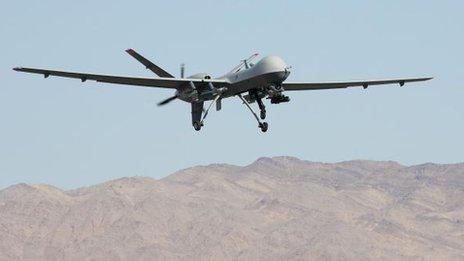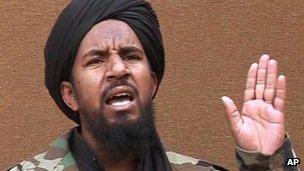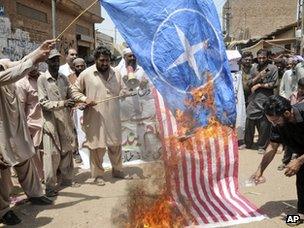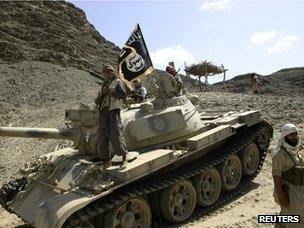Can al-Qaeda survive the drone strikes?
- Published

There have been eight US drone strikes in Pakistan over the past two weeks
Much is being made in Washington's defence and security circles of the demise this week of the man described as "al-Qaeda's Number Two".
Abu Yahya al-Libi - real name Mohammed Hassan Qaid - was killed on Monday by a missile fired from an unmanned aerial vehicle (UAV) or drone in Pakistan's tribal territory of North Waziristan.
A White House spokesman called it a major blow to al-Qaeda, saying that the dead militant had no clear successor.
So how much of a blow to the group is it in the long term? And can the wider al-Qaeda movement survive the steady attrition of its operational leaders by the targeted missile strikes that have increased dramatically under President Barack Obama?
'Core al-Qaeda'
Amongst his jihadist admirers, Abu Yahya al-Libi possessed a rare combination of operational and organisational skills, Islamic scholarly credentials, charisma and an almost folkloric status as the man who broke out of Bagram airbase in Afghanistan in 2005.

The White House said Abu Yahya al-Libi death had dealt a heavy blow to al-Qaeda
(To the intense embarrassment of the Pentagon, he managed to escape from under the noses of his US captors from the supposedly high-security military jail there.)
Libi was one of the key central figures of what has become known as "Core al-Qaeda", based in Pakistan, and his role has been described as that of a "general manager" overseeing the leadership's relations with other branches in places like Yemen.
As a Libyan in an organisation dominated by Saudis and Egyptians, he also had a role as a go-between.
"Libi was one of the few Libyans within al-Qaeda that could stomach [its current leader, Ayman] al-Zawahiri," says Sajjan Gohel of the Asia Pacific Foundation.
"There has often been a tense relationship between the Libyan and Egyptian factions within al-Qaeda and it is believed that Libi bridged that gap," Dr Gohel adds.
Controversial policy
His death by drone strike follows similar recent US missile strikes in Yemen and Somalia.
In the first five months of this year, there has been one strike in Somalia, 18 in Pakistan and 22 in Yemen.
The policy is highly controversial. Proponents of the drone strikes - mostly in US government circles - say they are having a devastating effect on al-Qaeda's leadership, killing off key operational commanders and leading ideologues like Anwar al-Awlaki at a faster rate than they can be replaced.
Supporters of the policy say they allow the US to eliminate its enemies in ungoverned places where there is no sovereign rule of law or where the federal government is unwilling to act.
But human rights activists argue the drone strikes amount to extrajudicial killings, and neutral observers worry that collateral casualties amongst the civilian population further deepen hostility to the US.
Although an on-the-ground investigation in Pakistan by the Associated Press this year found that "the drone strikes were killing far fewer civilians than many Pakistanis are led to believe and that a significant majority of the dead were combatants", the policy is still deeply unpopular at local level.
This month, a major US newspaper said that drone strikes had replaced the US detention centre at Guantanamo Bay as the prime recruiting sergeant for al-Qaeda's cause.
Resilience
Ten years ago, in the initial wake of the 11 September 2001 attacks in the US, the idea that robust "executive action" alone could defeat al-Qaeda would probably have held more sway than it does today.

Drone strikes have become a source of considerable resentment for many Pakistanis
But counter-terrorism officials reluctantly concede that the global jihadist movement is remarkably resilient, despite its loss of leaders, numbers and territory.
In 2001, al-Qaeda was driven out of Afghanistan, losing its training camps and its bases; it moved across the border into Pakistan then nurtured recruits living in the West.
In Yemen, an offshoot has exploited the chaos that surrounded the slow, violent departure of the previous president, Ali Abdullah Saleh, to take ground in the south and even establish its own rule of law in some towns.
In Iraq, jihadists who fought the US military and the Iraqi government are now believed to be turning their attention to the mayhem in Syria.
The longer the conflict in Syria continues unresolved, the greater the risk of a transnational influx of violent extremists. Already the country has suffered bombings of such devastating force that al-Qaeda's involvement is suspected.
Democratic threat
In the long term, perhaps the most serious threat to al-Qaeda lies not so much in the unseen death from the air through drone strikes but in an eventual evaporation of its cause.

In Yemen, an al-Qaeda offshoot has exploited the chaos caused by a pro-democracy uprising
Last year's mass democratic movement, dubbed by some the "Arab Spring" or "Arab Awakening", completely bypassed al-Qaeda, which had always insisted that violent jihad was the best and only path to just government.
With the recent departure of Western forces from Iraq and the imminent withdrawal of international combat forces from Afghanistan, the global jihadist movement will be deprived of a significant recruiting tool.
But it would be foolish to believe that the movement is finished.
Where there is weak and corrupt governance, a sense of injustice or deep resentment against the US, Israel or the West in general, the movement will still find recruits.
Since the London bombings of 2005, there have been numerous narrow escapes with sophisticated devices on planes, for example, evading security but failing to explode.
Al-Qaeda's operatives know that regardless of how many adherents the movement has left, they only need one successful high-profile "hit" to get back in the world's headlines.
- Published5 June 2012
- Published5 June 2012
- Published30 May 2012
- Published4 May 2012
- Published1 May 2012